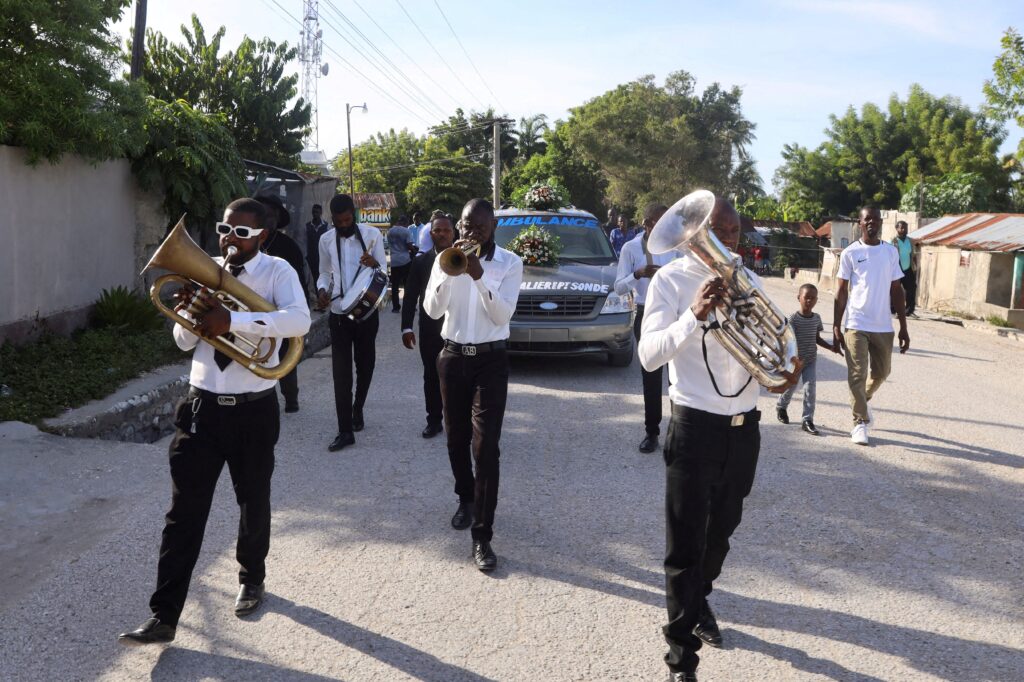
by Gina Christian, OSV News
(OSV News) — A recent massacre in Haiti that killed at least 115 people shows “the deteriorating situation in Haiti has yet ‘to touch bottom,'” Archbishop Thomas G. Wenski of Miami told OSV News.
Members of the Gran Grif de Savien gang stormed the town of Pont-Sondé during the early hours of Oct. 3, killing at least 115 and displacing more than 6,000. A local human rights group advised media that gang members had traveled by canoe to reach the village, which sits along the Artibonite River, to ambush residents.
On Oct. 9, Mayor Myriam Fièvre of Saint-Marc — a city about nine miles west of Pont-Sondé, to which thousands had fled after the attack — told The Associated Press that authorities were still searching for bodies.
The attack ranks as the worst in Haiti’s recent history, which has been plagued by multiple, sustained crises such as political instability, natural disasters, foreign intervention and international debt.
Archbishop Wenski — who is fluent in Haitian Creole, and whose archdiocese is home to an extensive and historic Haitian expatriate community — slammed both domestic and international efforts to restore order in Haiti, which has experienced high volatility in government leadership for several years.
In July 2021, Haitian President Jovenel Moïse was assassinated; in April 2023, the head of the United Nations office in Haiti warned the nation was sliding into “a catastrophic spiral of violence.” A year later, Prime Minister Ariel Henry resigned under pressure from armed groups, which have waged a brutal and chaotic territorial war in Haiti.
But the transitional council that succeeded Henry “was pretty much foisted on Haiti by the international community,” said Archbishop Wenski in an Oct. 10 email to OSV News. “Some of its members have been implicated in corruption schemes and the political parties represented on the council had in the past been credibly accused of abetting or supporting gang activity.”
Amid the power struggle, “the Haitian people. . . are suffering from gang violence including rape and kidnapping” and are “increasingly at risk for famine,” said Archbishop Wenski.
Some 5.4 million Haitians face “high levels of acute food insecurity” due to the armed gang violence, with 6,000 residents experiencing “catastrophic levels of hunger and a collapse of their livelihoods,” according to a report released in August by the Integrated Food Security Phase Classification.
“The country is completely sick” and its people “exhausted,” said Archbishop Max Leroy Mésidor of Port-au-Prince, president of the Haitian Catholic bishops’ conference, in a widely circulated audio message released after the Pont-Sondé attack.
The Haitian people “remain on the sidelines powerless to intervene in the apparent standoff between the ‘criminals in sandals’ (the gangs) and the ‘criminals in ties’ (the corrupted political class),” said Archbishop Wenski.
Describing Haiti as “a house on fire,” the archbishop also denounced ongoing moves by the U.S. and Dominican Republic governments to deport Haitians fleeing their homeland’s violence.
Such deportations amount to “sending (Haitians) back into the fire in violation of international treaties regarding non-refoulement of refugees,” said Archbishop Wenski.
Under international human rights law — such as the United Nations’ 1951 Refugee Convention and its 1967 Protocol — the fundamental principle of non-refoulement provides that refugees cannot be expelled to territories where substantial threats to life or freedom exist.






